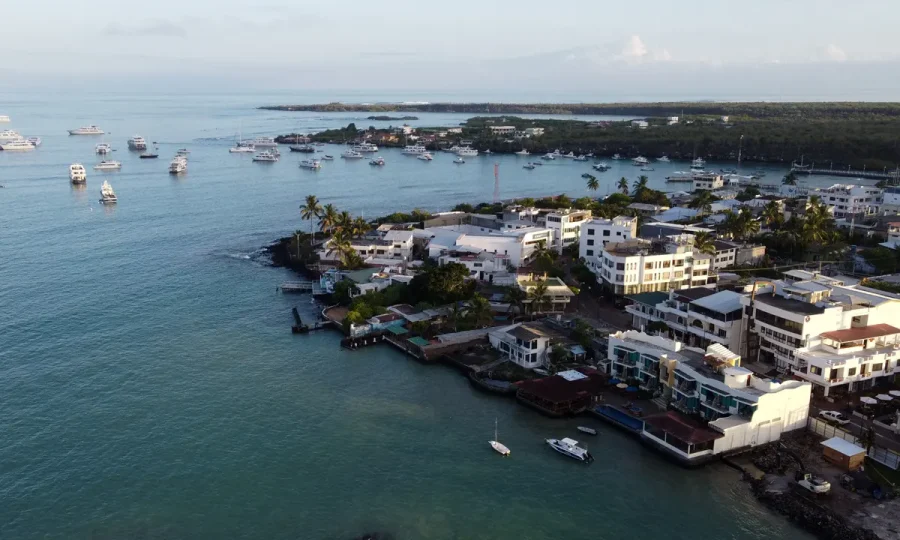In 2018, Ecuador joined the China-proposed Belt and Road Initiative (BRI). Over the past five years, the two countries reaped fruitful results in economic and trade cooperation as well as cultural and other exchanges. Recently, the two sides concluded the bilateral free trade agreement (FTA) negotiations at the technical level. Global Times (GT) reporter Liu Yang conducted an exclusive interview with Carlos Larrea (Carlos), Ambassador of Ecuador to China, in which the Ambassador shared his views on building up China-Ecuador good relations and close partnerships in Latin America, and he highly appreciated China’s anti-COVID contribution to the international community in the past years.
GT: What changes will be seen in foreign trade between China and Ecuador once the Free Trade Agreement (FTA) comes into force?
Carlos: The Ecuador-China FTA was efficiently negotiated over a period of 10 months, following the roadmap laid out by President Xi Jinping and President Guillermo Lasso during Lasso’s official visit to Beijing a year ago. The agreement focuses on reducing tariffs to enable market access and includes several disciplines such as rules of origin, improvement of customs procedures and trade facilitation, protocols for sanitary and phytosanitary measures and reduction of technical barriers to trade.
The signing of the Ecuador-China FTA will take place in the coming weeks, after the completion of the respective processes of formalization of the offers, translation, and legal review, on a date to be announced by both governments.
The entry into force of this trade agreement will provide preferential access for 99 percent of Ecuador’s current exports to China, mainly agricultural and agro-industrial products such as shrimp, bananas, roses and flowers, cocoa, coffee. It will also open the doors to exports of non-traditional products such as pitahaya, pineapple, mango, blueberries, quinoa, processed foods, fresh and canned fruits, and many other agricultural and agro-industrial products.
This trade instrument will substantially improve the access of Ecuador’s exportable supply to a market of more than 1.4 billion consumers, thus boosting the increase of exports, employment generation, growth, and investment attraction. Currently, joint trade between Ecuador and China exceeds $10 billion, which is strengthening and growing steadily. China is Ecuador’s main non-oil trade partner. The deepening and expansion of trade, thanks to the trade agreement, will bring significant benefits for both countries.
GT: On January 8 this year, China formally downgraded COVID-19 response. What are the benefits for Ecuador and the world?
Carlos: Public opinion has welcomed the decision of the Chinese authorities to proceed with this progression. China’s measures on cross-border travel from January 8 will strengthen confidence for large-scale investment, and major ports and industries in the world’s second-largest economy will quickly return to normalcy.
It will be a substantive contribution to the world economy, which has yet to overcome widespread inflation and the consequences of the Russia-Ukraine conflict, particularly the logistical, supply and energy problems. In the case of Ecuador, we are particularly pleased with the decision of the General Customs Administration to eliminate all control measures and nucleic acid detection for COVID-19 for imported foodstuffs. This will make it possible to regularize the flow of our foreign trade, the vast majority of which is made up of products that transit in cold chain, such as frozen white shrimp, which is highly prestigious among Chinese consumers and whose exports have increased exponentially thanks to its high quality, traceability, and safety.
The Ecuadorian president has mentioned that the achievement of vaccination against COVID-19 is also – and to a large extent – a merit of world diplomacy in which China has played a decisive role, especially with developing countries.
GT: What kind of cooperation has taken place between China and Ecuador to combat the pandemic?
Carlos: China has been and is undoubtedly an important player in international cooperation to combat COVID-19. President Guillermo Lasso was one of the first leaders in the region to visit China since the outbreak of the pandemic, as a gesture of thanks to China for the country’s support to Ecuador in dealing with COVID-19. The two countries have shown solidarity in the face of the pandemic and supported each other in overcoming the difficulties.
More than 50 percent of the doses of vaccines used in Ecuador came from China, which is a sign of effective implementation of the global community of health for all; there is also a decision to install a manufacturing plant of the biologicals in our country, thanks to an agreement with Sinovac.
GT: In 2018, Ecuador joined the China-proposed Belt and Road Initiative (BRI). What benefits have been brought to Ecuador under the initiative?
Carlos: The slogan “More Ecuador in the World and More of the World in Ecuador” allows us to relate with the entire international community to obtain benefits for our country. China does not impose conditions on countries with which it cooperates, and this is the cornerstone of a relationship of great friendship, respect, and trust, as our president has appreciated.
Bilateral relations are going through the best moment in their history. Our presidents have said so on several occasions. Ecuador and China uphold a vibrant bilateral agenda, framed in the Comprehensive Strategic Partnership and in a political exchange at the highest level characterized by the deployment of presidential diplomacy.
And, indeed, the new center of gravity of bilateral relations was configured based on the agreements reached by both presidents during the official visit to China on February 5, 2022, which brought together objectives of cardinal importance in these directions: cooperation in public health; the signing of the free trade agreement and the successful renegotiation of the bilateral debt, both in record time; the increase in bilateral and multilateral cooperation as well as cultural exchange and public diplomacy, among others, are a testimony to this affirmation.










